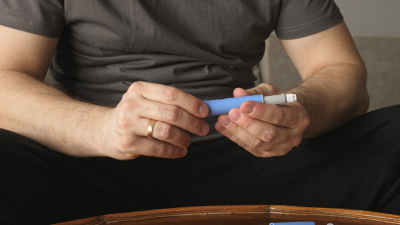Diabetes is a chronic metabolic disorder that affects millions of people worldwide. While often associated with issues like high blood sugar, insulin resistance, and increased risk of cardiovascular disease, diabetes can also have a significant impact on sexual health, particularly in men.
One of the most common sexual health problems faced by men with diabetes is erectile dysfunction (ED), which is simply the inability to achieve or maintain an erection. In this post, you’ll learn about the relationship between diabetes and erectile function, how diabetes can contribute to the development of ED, and what steps you can take to manage this condition.
Understanding Erectile Dysfunction
Erectile dysfunction is defined as the persistent inability to achieve or maintain an erection sufficient for satisfactory sexual performance. While occasional difficulty with erections is normal, persistent ED can be a sign of an underlying health issue, such as diabetes or heart disease.
The process of achieving an erection involves a complex interplay of psychological, neurological, and vascular factors. When a man becomes sexually aroused, the brain sends signals to the nerves in the penis, causing the blood vessels to relax and allow increased blood flow.
This influx of blood fills the spongy tissues of the penis, resulting in an erection. Any disruption to this process, such as nerve damage or reduced blood flow, can lead to erectile difficulties. It can even be affected by psychological issues, like anxiety or depression.
This is why working with a healthcare provider is so critical when treating ED—there are many potential causes that need to be explored.
How Diabetes Affects Erectile Function
Diabetes can impact erectile function in several ways. Here are some of the main issues that diabetes can cause.
Nerve Damage (Neuropathy)
High blood sugar levels associated with diabetes can damage the nerves throughout the body, including those involved in sexual arousal and erection.
This nerve damage, known as diabetic neuropathy, can impair the transmission of signals between the brain and the penis, making it more difficult to achieve and maintain an erection.
Blood Vessel Damage
Diabetes can also damage the blood vessels, causing them to become narrow or hardened. This condition, known as atherosclerosis, can restrict blood flow to the penis, making it more challenging to achieve and maintain an erection.
Additionally, poor circulation can reduce the oxygen and nutrient supply to the penis, further contributing to erectile difficulties.
Hormonal Imbalances
Diabetes can lead to hormonal imbalances, particularly in terms of testosterone levels. Low testosterone, which is more common in men with diabetes, can contribute to decreased libido and erectile dysfunction.
Medication Side Effects
Some medications used to treat diabetes, such as certain blood pressure medications, can have side effects that include erectile dysfunction. It's essential to discuss any potential side effects with your healthcare provider and explore alternative treatment options if necessary.
Risk Factors for Erectile Dysfunction in Men with Diabetes
Several factors can increase the risk of developing erectile dysfunction in men with diabetes.
- Poor blood sugar control: High blood sugar levels over an extended period can increase the risk of nerve and blood vessel damage, leading to ED.
- Duration of diabetes: The longer a man has had diabetes, the higher the risk of developing ED.
- Obesity: Being overweight or obese can contribute to insulin resistance and increase the risk of ED. For many men suffering from diabetes, weight loss is one of the primary recommendations.
- Smoking: Cigarette smoking can damage blood vessels and increase the risk of ED, especially in men with diabetes.
- Sedentary lifestyle: Lack of physical activity can contribute to poor circulation and increase the risk of ED.
Managing Erectile Dysfunction in Men with Diabetes
If you have diabetes and are experiencing erectile dysfunction, there are several steps you can take to manage this condition.
Blood sugar control
Work closely with your healthcare provider to maintain optimal blood sugar levels through a combination of diet, exercise, and medication.
Lifestyle changes
Adopt a healthy lifestyle that includes regular exercise, a balanced diet, stress management, and quitting smoking. Fat reduction should be a top priority.
Medications
PDE5 inhibitors, such as sildenafil (Viagra), tadalafil (Cialis), and vardenafil (Levitra), can be effective in treating ED in men with diabetes. However, these medications may not be suitable for everyone, particularly those with certain heart conditions or taking certain other medications.
Psychological support
ED can have a significant impact on mental health and relationships. Seeking support from a mental health professional or couples counselor can help you cope with the emotional aspects of ED and improve communication with your partner.
Open communication
Discuss your concerns openly with your healthcare provider and your partner. ED is a common issue, and there are many treatment options available. By working together, you can find the best approach for managing ED and maintaining a healthy, satisfying sex life.
Don’t Let Diabetes Rule Your Sex Life
Diabetes can have a significant impact on erectile function, but it is important to remember that ED is a treatable condition. By understanding the relationship between diabetes and erectile dysfunction and taking proactive steps to manage your health, you can reduce your risk of ED and improve your overall sexual well-being.
If you are experiencing persistent ED, don't hesitate to reach out to your healthcare provider. They can perform a thorough evaluation, including testing your hormone levels, to determine the underlying causes of your ED and recommend personalized treatment options to help you regain and maintain optimal sexual function.
Remember, managing diabetes is not just about controlling blood sugar levels—it's about taking a holistic approach to your health, including your sexual well-being. By working closely with your healthcare team, making lifestyle changes, and being open with your partner, you can successfully manage erectile dysfunction and enjoy a fulfilling sex life.
Learn more about advanced erectile dysfunction solutions here, or discuss your options by scheduling an appointment with a specialist today.

